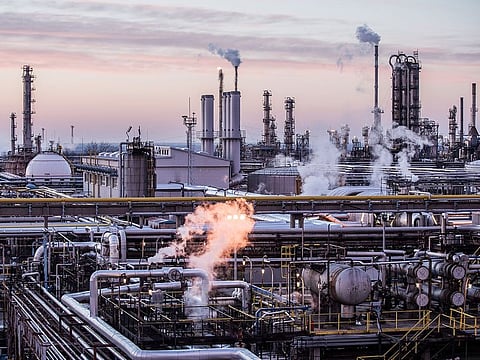Oil soars after Iran launches rockets at Israel in direct attack
Safe haven assets gold, bonds, and the US dollar all advance while stocks drop

Oil surged after Iran fired rockets at Israel, potentially increasing the chance of supply disruptions in a region that pumps a third of the world's crude. Safe haven assets gold, bonds, and the US dollar too advanced with oil, while US stocks dropped further.
"A short while ago, missiles were launched from Iran towards the State of Israel," the Israel Defense Forces said in a statement. The US had said it was supporting preparations to defend Israel against the possible attack, which would carry severe consequences for Iran.
The direct involvement of OPEC member Iran in the conflict may increase the possibility of oil-supply disruptions in the region. Iran's output rose to a six-year high of 3.37 million barrels a day in August before easing slightly in September. The nation was the world's ninth-largest oil producer last year, according to US figures.
"The key factor for crude will be whether Israeli defense systems are able to shield against the attack and what subsequent actions Israel might take," said Rebecca Babin, senior energy trader at CIBC Private Wealth. "In the near term, we could see a few more dollars of short covering in crude."
Gold, bonds rise with oil on escalating Mideast crisis, stocks drop
Gold briefly climbed above $2,670 an ounce as oil rose more than 5 per cent to top $71 a barrel, reversing earlier losses. Global benchmark Brent climbed near $75 a barrel. In the US equities market, tech stocks were the worst performers with Apple Inc. and Nvidia Corp. sinking more than 3 per cent. The Nasdaq 100 lost 1.6 per cent and the S&P 500 fell 1.0 per cent as Treasuries advanced.
Risk of oil-supply disruptions
The conflict marks one of the most significant threats to oil supplies since Russia's invasion of Ukraine, which roiled global markets. Surging crude prices are also likely to be a major concern for consumers who were just experiencing some relief as inflation eased in many parts of the world. In the US, where gas prices are a key focus for voters, both presidential candidates will also be keen to mitigate a potential spike in pump prices.
Oil speculators had been piling into the most bearish market positions on record, driven by concerns about weakening demand growth. The elevated short bets have left the market vulnerable to quick surges if those bets need to be unwound.
Tensions in the Middle East have increased after the killing of Hezbollah's chief, Hassan Nasrallah, last week. On Monday, Israel bombed the center of Beirut and its troops have begun what it called "targeted ground raids."
The flare-up in the Middle East has also injected volatility into the previously sleepy market. One gauge of implied volatility in Brent crude on Tuesday surged to the highest since January.
Last quarter, WTI dropped 16 per cent on expectations that OPEC+ will make good on plans to bring back production at the same time that output from outside of the cartel is increasing. Concerns about tepid demand in China, the world's largest crude importer, have also weighed on prices.
Sign up for the Daily Briefing
Get the latest news and updates straight to your inbox



